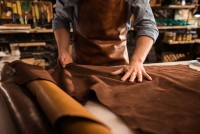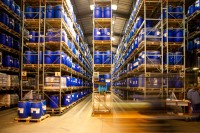A considerable and increasing number of TFL wet-end products already contain high amounts of renewable components. The natural sources may derive from animal-based by-product proteins to vegetable-based oils for leather softening, that do not compete with the food chain. The recently launched TFL high profilebio-products ranges are already well-known in the market.Plant originsMagnopal Pure A is based on plant origin materials, such as cellulose, and uses enzymatic hydrolysis to make it water soluble, leading to an overall 93% biobased score. Typically, about 4-6% is applied for a wide range of end uses such as footwear, automotive and furniture leather lightweight articles. lt is also especially suitable for tight grainleathers. Magnopal Pure A can replace a part of traditional retanning agents in the recipe such as syntans and/or vegetable tannins but with the advantage of a high exhaustion like typical polymers.
Levotan X-Biomers, on the contrary, are largely based on animal by-product proteins, such as recycled leather shavings, with or without amylose and/ or vegetable proteins and then functionalised, resulting in up to 95% biobased final products. A typical example would be Levotan X-Biomer RX-C Liq., a bioresin capable of substituting typical amino resins in the recipe. Its main end-use would be all types of leather that require "selective filling", free of formaldehyde, such as shoe upper and even leather for automotive applications.
However, traditional "industrystandard" products that have formed the bedrock of the company for decades are also undergoing a transformation and there are already many examples of high bio-content alternatives now available too. Similarly, in finishing, natural based products are also rapidlygrowing in importance. Even polyurethane dispersions and isocyanate crosslinkers are increasingly becoming more "bio". This TFL technology now enables the leather industry to develop not only elegant, classic season and polished finishes but also high-performance articles such as automotive leather with increased sustainability.
TFL goes to great lengths to support customers by arming its technical staff with "whitelists" to ensure that the best products are selected from the outset to attain the required article and performance. TFL has also taken a major step further, having developed wet-end and finishing calculation tools that determine the exact amount of renewable chemistry by simply writing a recipe.
With this invaluable knowledge, TFL is now able to inform customers about the exact bio content in their leathers. TFL customers can then exploit this information to support their own sales success and lead to leather being increasingly recognised as the ultimate sustainable material.
International Leather Maker May/June 2022



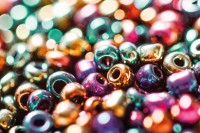

 Main Reaction - The TFL Blog Stories, incidents, tips and facts around the topics leather, chemistry, fashion, sustainability and ecology. Our editorial staff consisting of experienced tanners, scientists, market experts, fashion and communication specialists has sharped their pencils and will supply you with fresh and inspiring content on a regular basis.
Main Reaction - The TFL Blog Stories, incidents, tips and facts around the topics leather, chemistry, fashion, sustainability and ecology. Our editorial staff consisting of experienced tanners, scientists, market experts, fashion and communication specialists has sharped their pencils and will supply you with fresh and inspiring content on a regular basis.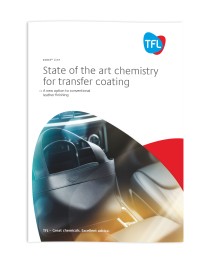
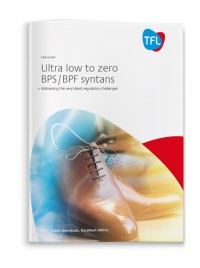
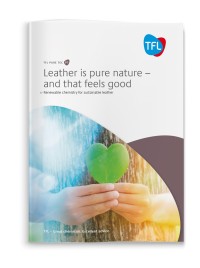
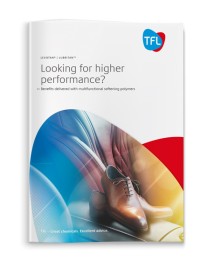 LEVOTAN® / LUBRITAN™ - Looking for higher performance? Tanners around the world are facing increasing challenges from their customers, for example, demands for higher performance such as fastness to light and heat resistance, but also lighter weight leather and more recently odour / emissions avoidance.
LEVOTAN® / LUBRITAN™ - Looking for higher performance? Tanners around the world are facing increasing challenges from their customers, for example, demands for higher performance such as fastness to light and heat resistance, but also lighter weight leather and more recently odour / emissions avoidance.




